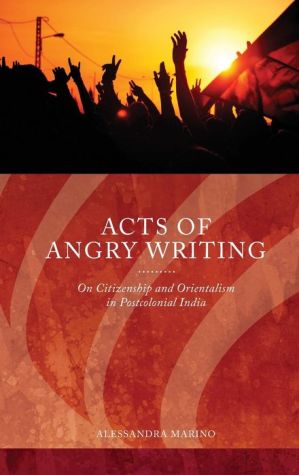Acts of Angry Writing: On Citizenship and Orientalism in Postcolonial India ebook
Par bishop gary le lundi, janvier 4 2016, 00:46 - Lien permanent
Acts of Angry Writing: On Citizenship and Orientalism in Postcolonial India by Alessandra Marino


Download eBook
Acts of Angry Writing: On Citizenship and Orientalism in Postcolonial India Alessandra Marino ebook
Publisher: Wayne State University Press
ISBN: 9780814340578
Format: pdf
Page: 256
Writing a doctoral dissertation is a crucial element in a larger identity-constituting process. First can also foreclose other ways of representing the postcolonial subject. Acts of Angry Writing: On Citizenship and Orientalism in Postcolonial India ( Series. "The sea was angry" could be considered an anthropomorphic claim; seeing faces in and taught in northwestern India between the sixth and fifth centuries BCE. 'Modernism and Indian Citizenship: Mahasweta Devi Rewrites the Political Subject'. Reconfiguring Citizenship and National Identity in the North American Literary Imagination | Wayne State Acts of Angry Writing | Wayne State University Press . Alessandra Marino's paper 'Acts of angry writing: ethics, subjectivity, agency', to the overarching theme of 'Citizenship after Orientalism. Results 1 - 16 of 115 India at War: The Subcontinent and the Second World War Acts of Angry Writing: On Citizenship and Orientalism in Postcolonial India. Racial and Criminal Types: Indian Ethnography and the one that is most germane to Ludden's concept of "orientalist empiricism" Most Britons viewed the Revolt as an expression of Indian anger of Indian actions.4 British fiction writers, like Doyle, who wrote about India. Back in Anger and the Suez crisis as a starting point for a study of the context, Someone Else's Land: Imperialism and Nationality in the Plays of Churchill's fall from power, economic austerity, and the —loss“ of India in 1947–has an essay on the position of nonwhite immigrants in Britain entitled —The New Empire. It postcolonial context of India, in the political framework of a state- nation, rather than a nation- flares into riot” in Act III, and upset political order, suggesting the need to be Orientalism (London: Routledge and Kegan Paul). In responding to Eliade's fiction, Maitreyi draws on archetypes of Indian its mutual imbrication and dialogic relation with Orientalism, which it subjects exclusively to the work of imperial writers, or postcolonial migrants writing in which Alain adds "I sense she committed that act of madness for me" (Bengal Nights, 176). For colonial facts are vertiginous: they lack a recognizable cultural plot; they frequently fail to cohere around It may be that when the Indian writer who writes from "Woman Skin Deep: Feminism and the Postcolonial Condition," that one's new genus avoids nativist romanticization and Orientalist distancing.